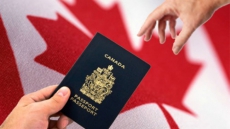PARIS — France's top administrative court overturned a ban on burkinis in a Mediterranean town, in a decision Friday that should set legal precedent regarding a swimsuit crackdown that has divided the country and provoked shock around the world.
The ruling by the Council of State Friday specifically concerns a ban on the Muslim garment in the Riviera town of Villeneuve-Loubet, but the binding decision is expected to impact all the 30 or so French resort municipalities that have issued similar decrees.
The bans grew increasingly controversial as images circulated online of some Muslim women being ordered to remove body-concealing garments on French Riviera beaches.
Lawyers for a human rights group and a Muslim collective challenged the legality of the ban to the top court, saying the orders infringe basic freedoms and that mayors have overstepped their powers by telling women what to wear on beaches.
Mayors had cited multiple reasons for the bans, including security after a string of Islamic extremist attacks, risk to public order, and France's strict rules on secularism in public life.
The Council of State ruled that, "The emotion and concerns arising from the terrorist attacks, notably the one perpetrated in Nice on July 14, cannot suffice to justify in law the contested prohibition measure."
It ruled that the mayor of Villeuneuve-Loubet overstepped his powers by enacting measures that are not justified by "proven risks of disruptions to public order nor, moreover, on reasons of hygiene or decency."
"The contested decree has thus brought a serious and manifestly illegal infringement on basic freedoms such as freedom to come and go, freedom of conscience and personal freedom," the ruling reads.
Lawyer Patrice Spinosi, representing the Human Rights League, told reporters in Paris that women who have already received fines can protest them based on Friday's decision.

"It is a decision that is meant to set legal precedent," he said. "Today all the ordinances taken should conform to the decision of the Council of State. Logically the mayors should withdraw these ordinances. If not legal actions could be taken" against those towns.
But the mayor of the Corsican town of Sisco said he wouldn't lift the ban he imposed after an Aug. 13 clash on a beach.
"Here the tension is very, very, very high and I won't withdraw it," Ange-Pierre Vivoni said on BFM-TV.
He said he doesn't know whether a woman was actually wearing a burkini the day a clash occurred that set a group of Corsican sunbathers of North African origin against villagers from Sisco. It took days to untangle the events leading to the violence that many immediately assumed was over a burkini sighting.
The bans have become a symbol of tensions around the place of Islam in secular France.
Many officials —including Prime Minister Manuel Valls — have argued that burkinis oppress women. But critics say the bans were feeding a racist political agenda as campaigning for next year's French presidential elections were kicking off.
WHY BURKINI SWIMSUITS ARE CAUSING CONTROVERSY
PARIS — French mayors are drawing international anger for banning the burkini, an all-encompassing swimsuit worn by a small minority of Muslim women. We explains the core of the controversy.
WHAT ARE BURKINIS?
They're a recent retail invention, not a religious requirement in any country. Around a decade ago an Australian woman of Lebanese origin created a swimsuit for Muslim women designed to permit them to keep their bodies covered while working as lifeguards on Australian beaches. Her design was dubbed the burkini or burqini.
Burkinis cover the head, torso and limbs — much like a wetsuit with a hood. The word conflates the words bikini and burqa, a full-body covering with only a mesh screen for the eyes. Burqas are worn primarily in Afghanistan.
Burkinis are rarely seen in France, where you're more likely to spot women sunbathing topless. International sales reportedly have soared in response to French efforts to restrict their public display.

WHY BAN THEM?
France is both exceptionally secular and unusually fearful of Islamic extremism following last month's truck attack in Nice that killed 86 people and slaying of a Catholic priest during Mass in Normandy, both claimed by the Islamic State group.
While the burkini's defenders have argued that the wearing of the garment has nothing to do with promoting bloodshed, mayors have countered that wearing the outfits could undermine public order by make other beachgoers angry or afraid.
The French, who famously ban baggy men's swim trunks from their pools, also argue that excessively large women's swimwear poses a similar risk to public hygiene.
Prime Minister Manuel Valls says burkinis represent the enslavement of women and puts his opposition in the context of France's promotion of women's rights worldwide.
But France's predominant argument is that the burkini violates France's century-old commitment to promote secularism in public life. The first article of the French constitution enshrines this principle, while polls show French people are among the least religious in the world. France repeatedly has cited this secularist agenda when targeting Muslim practices that are seen to push religion too far into mainstream society.
BACKLASH TO THE BANS
French Muslims say they feel stigmatized by the restrictions, while some police have complained that the new rules are too vague or problematic to be enforced.
Images this week that showed Nice police appearing to instruct a burkini-clad beachgoer to remove her tunic stirred indignation online. Human rights groups petitioned France's highest administrative authority, the Council of State, which plans to issue its ruling Friday on the burkini bans.
The policy is raising tensions within French President Francois Hollande's leftist government, too.
IT'S POLITICS
Critics say the anti-burkini crusade reflects a far right, anti-Muslim agenda that could prove to be a vote-winner in France's 2017 presidential election.
Many mayors to the fore on the issue are members of former President Nicolas Sarkozy's conservative Republicans party. Sarkozy, who is seeking re-election, said Wednesday: "We don't imprison women behind fabric."
He linked burkinis to radicalized Islam, a contention that many Muslims regard as baseless and dangerous. But this kind of rhetoric could help Sarkozy win votes from the anti-immigrant National Front party of Marine Le Pen, a presidential contender who has campaigned against what she calls the Islamization of France.
Burkinis pose a dilemma for the French left, a staunch defender of women's rights. The prime minister and women's affairs minister support the bans because they say burkinis oppress women; the education minister and health minister say authorities shouldn't dictate what women wear.
A LESS SECULAR WORLD

France's stringent secularism is exceptional in the western world, and much of the rest of the world is struggling to understand France's actions. Protesters rallied Thursday against the French bans in London and Berlin.
Burkinis are sold by major retailers in Britain. Elsewhere in Europe, burkinis are rare but no municipal bans exist.
Not yet anyway. In Belgium, the right-leaning Flemish N-VA party doesn't want burkinis on public beaches, calling it a sign of oppressing women.
THE MUSLIM FASHION
Women in Muslim countries wear a range of swimwear, from bikinis to full-length garments, reflecting their personal tastes and understanding of their faith.
Burkini-style wear has generated debate in Morocco, with its large tourism industry. In Egypt, some resorts, elite clubs and restaurants ban veils entirely and the wearing of burkini-style outfits in swimming pools. Religious conservatives, who have been gaining ground, say such bans perpetuate a colonized mentality by enforcing Western-inspired freedoms and styles.
THE LATEST: MAYOR SAYS BURKINI RULING WILL HEIGHTEN TENSIONS
6:05 p.m.
The mayor of the French town whose burkini ban was suspended by the Council of State, says the ruling will "heighten passions and tensions."
Conservative Villeneuve-Loubet Mayor Lionnel Luca told reporters that "rampant Islamization is progressing in our country" and with the ruling to suspend his town's ban on burkinis at public beaches "they've gained a small additional step."
"Far from calming, this decision can only heighten passions and tensions, with the risk of trouble we wanted to avoid," he said.
Luca, also a lawmaker, said that now only a law can now stop troubles since mayors cannot do so. He suggested he would take action when Parliament returns from its summer leave — but did not say what kind of law he would seek.
Former conservative President Nicolas Sarkozy, who announced this week he's seeking the conservative nomination for the presidential race, said Thursday that he wants a law banning the burkini "on the entire territory of the Republic."

4:30 p.m.
National Front leader Marine Le Pen says the overturning of a ban on burkinis in a French Mediterranean town is "not surprising" but the battle is not over.
The right-wing leader said that lawmakers must vote "as quickly as possible" on an extension of the 2004 law that banned Muslim headscarves and other ostentatious religious symbols in classrooms to include all public spaces.
Le Pen, who is running for president in the 2017 race, wrote in a statement that: "The burkini would obviously be part of it."
Former conservative President Nicolas Sarkozy, who announced this week he's seeking the conservative nomination for the race, said at a rally Thursday night in southern France that he wants a law banning the burkini "on the entire territory of the Republic."
___
4:10 p.m.
Amnesty International is praising a French court decision against bans of burkini swimsuits, calling such decrees invasive and discriminatory.
John Dalhuisen, Amnesty International's Europe Director, said in a statement Friday: "By overturning a discriminatory ban that is fuelled by and is fuelling prejudice and intolerance, today's decision has drawn an important line in the sand."
Several French towns banned the burkini for reasons including security and fears of public disorder. France's Council of State ruled Friday that a burkini ban in one Riviera town is not justified and violates several fundamental rights.
Many human rights groups denounced the bans, which caused shock outside French borders.
"Invasive and discriminatory measures such as these restrict women's choices and are an assault on their freedoms," Dalhuisen said. "The enforcement of these bans leads to abuses and the degrading treatment of Muslim women and girls."
___
3:30 p.m.
A human rights lawyer says the decision by France's top administrative court to overturn a ban on burkini swimsuits should set a legal precedent for the whole country.
Lawyer Patrice Spinosi, representing the Human Rights League, told reporters that other mayors who have banned burkinis must conform to Friday's decision regarding the town of Villeneuve-Loubet. He also said women who have already received fines can protest them based on Friday's decision.
"It is a decision that is meant to set legal precedent," he said. "Today all the ordinances taken should conform to the decision of the Council of State. Logically the mayors should withdraw these ordinances. If not legal actions could be taken" against those towns.
"Today the state of law is that these ordinances are not justified. They violate fundamental liberties and they should be withdrawn."
Human Rights League was among the groups that brought the lawsuit against the town of Villeneuve-Loubet, saying the orders infringe basic freedoms.
___
3:25 p.m.
The mayor of Sisco in northern Corsica says he won't lift his ban on the burkini despite a ruling by France's top administrative court regarding a similar ban in another town.
Ange-Pierre Vivoni had banned the burkini after an Aug. 13 clash on a beach in Sisco.
He told BFM-TV Friday: "Here the tension is very, very, very strong and I won't withdraw it."
He conceded he doesn't know whether a woman was actually wearing a burkini the day a clash occurred that set a group of sunbathers of North African origin, from another town, against villagers from Sisco.
It took days to untangle the events leading to the violence that many immediately assumed was over a burkini siting.
___
3:10 p.m.
France's top administrative court has overturned a town burkini ban amid shock and anger worldwide after some Muslim women were ordered to remove body-concealing garments on French Riviera beaches.
The ruling by the Council of State Friday specifically concerns a ban in the Riviera town of Villeneuve-Loubet, but the binding decision is expected to set a legal precedent for all the 30 or so French resort municipalities that have issued similar decrees.
Lawyers for two human rights groups challenged the legality of the ban to the top court, saying the orders infringe basic freedoms and that mayors have overstepped their powers by telling women what to wear on beaches.
Mayors had cited concern about public order after deadly Islamic extremist attacks this summer, and many officials have argued that burkinis oppress women.
Lawyer Patrice Spinosi, representing the Human Rights League, told reporters that the decision should set a precedent, and that other mayors should conform to it. He also said women who have already received fines can protest them based on Friday's decision.

10:05 a.m.
France's highest administrative court is considering whether it's legal for towns to ban body-covering burkini swimsuits, which have become a symbol of tensions around the place of Islam in secular France.
After human rights groups challenged a local burkini ban, the Council of State is scheduled to issue a ruling Friday afternoon.
At a hearing Thursday, lawyers for the rights groups argued that the bans are feeding fear and infringe on basic freedom. Mayors who have banned burkinis cite concern about public order after deadly Islamic extremist attacks this summer, and many officials argue that burkinis oppress women.
The bans have divided France's government and society and drawn anger abroad, especially after images circulated online showing police appearing to force a Muslim woman to take off her tunic.



